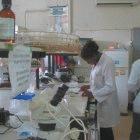Africa's scientific revolution must start at the roots
If Africa is to build a sustainable science and technology infrastructure, it needs more than enthusiastic promises from heads of state.
 Almost thirty years ago, African leaders meeting in the Nigerian city of Lagos promised "to put science and technology in the service of development by reinforcing the autonomous capacity of our countries in this field". Central to this strategy was a pledge that each country would devote one per cent of its gross domestic product (GDP) to supporting research and development (R&D).
Almost thirty years ago, African leaders meeting in the Nigerian city of Lagos promised "to put science and technology in the service of development by reinforcing the autonomous capacity of our countries in this field". Central to this strategy was a pledge that each country would devote one per cent of its gross domestic product (GDP) to supporting research and development (R&D).
This week (30 January) a virtually identical promise was made by the heads of member countries of the African Union (AU) at their 8th summit meeting in Addis Ababa, Ethiopia. The meeting heard a series of speeches about the importance of scientific and technological capacity to development — and again finished with a vow to spend one per cent of GDP on R&D.
For president Paul Kagame of Rwanda, one of the most persuasive spokesmen for this strategy, there was at least one positive aspect to watching history repeat itself. The repeat of the Lagos commitment, he said, showed that African leaders and policymakers had "got it right" in 1980 (see 'Turn words into actions' Rwandan president urges).
But, as Kagame himself admitted, Africa has suffered too often from a gap between intentions and reality. If the continent is to create its own scientific and technological revolution, fine words from the top must be complemented by sustainable change implemented from the bottom.
Reasons for failure and optimism
There are many reasons why the 1980 promise has not been achieved. Some of the blame lies heavily on the West, in particular on the 'structural adjustment' policies of lending agencies like the World Bank that forced African countries to reduce spending on public services such as universities and government laboratories.
Other reasons for failure can be found in the civil wars that have since affected much of the continent. In some countries, government spending has been skewed towards costly military technology at the expense of social needs. And regional conflicts have made the stable political and economic environment needed for scientific and technological infrastructure impossible.
Fortunately, and despite continued trouble spots such as Sudan, political stability is now spreading across the continent. Indeed, this is one important reason for optimism that the commitment made in Addis this week — and indeed the growing enthusiasm for science and technology among African governments — will achieve more success than the promises of three decades ago.
Another encouraging note is clear evidence from the summit that African leaders are turning their attention away from a narrow focus on the importance of R&D toward broader concerns over the steps needed across the board to stimulate technological innovation.
But these are insufficient to address a third reason for the previous plan's failure. The earlier political commitment to science- and technology- based development was never fully embedded in 'bottom-up' institutions and initiatives such as small and medium enterprises (SMEs) and community self-help groups. These are the lifeblood of economic and social growth and the wellspring of genuine, sustainable innovation.
Fortunately, there were several signs in last week's summit that at least part of this message has been taken on board. For example, AU heads of state gave approval to a 20-year capacity-building strategy for biotechnology that rests heavily not only on national and regional initiatives, but also on active engagement from SMEs and social entrepreneurs (see 'AU endorses biotechnology plan, but not science fund').
Similarly, there was general recognition that extra spending on R&D will only work if it is combined with policies that enable the money to be spent effectively — in financing technical training and supportive regulatory structures, for example. As Kagame said, "it is not just about investment in science and technology, but also about improving the efficiency of this investment".
The need for communication and debate
But last week's meeting also held its disappointments — such as the failure to agree on details of a new and widely anticipated African Science and Innovation Fund. One reason for this is reported to have been difficulty in finding a formula to ensure adequate 'buy-in' from African governments.
This in turn partly reflects the difficulty these governments have in persuading their voting public of the importance of investing in science and technology. Ironically, but perhaps inevitably, much of the public (and media) interest surrounding the summit lay in its launch of the African Year of Football.
The heads of state said little in either their individual presentations or collective conclusions about the need for better communication to the public of scientific and technological information. But without this it will be impossible to create the conditions essential to effectively integrate science and technology into development strategies.
Political leaders' recognition of the need for such integration will, hopefully, increase the chance of that happening. Indeed, for many that was the most important outcome of the AU summit.
But if science is to be as important as football in African cultures, much more is needed. Ideas from across the continent about how this might be achieved are being actively debated in our AU discussion forum. You are invited to join the debate and help to ensure that, in 30 years' time, it will be possible to say that at the 2007 summit, not only did the heads of state "get it right" but the correct actions followed.
David Dickson
Greener News Room
Keywords:: AFRICA SUMMIT ADDIS ABABA TECHNOLOGY SCIENCE
 Almost thirty years ago, African leaders meeting in the Nigerian city of Lagos promised "to put science and technology in the service of development by reinforcing the autonomous capacity of our countries in this field". Central to this strategy was a pledge that each country would devote one per cent of its gross domestic product (GDP) to supporting research and development (R&D).
Almost thirty years ago, African leaders meeting in the Nigerian city of Lagos promised "to put science and technology in the service of development by reinforcing the autonomous capacity of our countries in this field". Central to this strategy was a pledge that each country would devote one per cent of its gross domestic product (GDP) to supporting research and development (R&D).This week (30 January) a virtually identical promise was made by the heads of member countries of the African Union (AU) at their 8th summit meeting in Addis Ababa, Ethiopia. The meeting heard a series of speeches about the importance of scientific and technological capacity to development — and again finished with a vow to spend one per cent of GDP on R&D.
For president Paul Kagame of Rwanda, one of the most persuasive spokesmen for this strategy, there was at least one positive aspect to watching history repeat itself. The repeat of the Lagos commitment, he said, showed that African leaders and policymakers had "got it right" in 1980 (see 'Turn words into actions' Rwandan president urges).
But, as Kagame himself admitted, Africa has suffered too often from a gap between intentions and reality. If the continent is to create its own scientific and technological revolution, fine words from the top must be complemented by sustainable change implemented from the bottom.
Reasons for failure and optimism
There are many reasons why the 1980 promise has not been achieved. Some of the blame lies heavily on the West, in particular on the 'structural adjustment' policies of lending agencies like the World Bank that forced African countries to reduce spending on public services such as universities and government laboratories.
Other reasons for failure can be found in the civil wars that have since affected much of the continent. In some countries, government spending has been skewed towards costly military technology at the expense of social needs. And regional conflicts have made the stable political and economic environment needed for scientific and technological infrastructure impossible.
Fortunately, and despite continued trouble spots such as Sudan, political stability is now spreading across the continent. Indeed, this is one important reason for optimism that the commitment made in Addis this week — and indeed the growing enthusiasm for science and technology among African governments — will achieve more success than the promises of three decades ago.
Another encouraging note is clear evidence from the summit that African leaders are turning their attention away from a narrow focus on the importance of R&D toward broader concerns over the steps needed across the board to stimulate technological innovation.
But these are insufficient to address a third reason for the previous plan's failure. The earlier political commitment to science- and technology- based development was never fully embedded in 'bottom-up' institutions and initiatives such as small and medium enterprises (SMEs) and community self-help groups. These are the lifeblood of economic and social growth and the wellspring of genuine, sustainable innovation.
Fortunately, there were several signs in last week's summit that at least part of this message has been taken on board. For example, AU heads of state gave approval to a 20-year capacity-building strategy for biotechnology that rests heavily not only on national and regional initiatives, but also on active engagement from SMEs and social entrepreneurs (see 'AU endorses biotechnology plan, but not science fund').
Similarly, there was general recognition that extra spending on R&D will only work if it is combined with policies that enable the money to be spent effectively — in financing technical training and supportive regulatory structures, for example. As Kagame said, "it is not just about investment in science and technology, but also about improving the efficiency of this investment".
The need for communication and debate
But last week's meeting also held its disappointments — such as the failure to agree on details of a new and widely anticipated African Science and Innovation Fund. One reason for this is reported to have been difficulty in finding a formula to ensure adequate 'buy-in' from African governments.
This in turn partly reflects the difficulty these governments have in persuading their voting public of the importance of investing in science and technology. Ironically, but perhaps inevitably, much of the public (and media) interest surrounding the summit lay in its launch of the African Year of Football.
The heads of state said little in either their individual presentations or collective conclusions about the need for better communication to the public of scientific and technological information. But without this it will be impossible to create the conditions essential to effectively integrate science and technology into development strategies.
Political leaders' recognition of the need for such integration will, hopefully, increase the chance of that happening. Indeed, for many that was the most important outcome of the AU summit.
But if science is to be as important as football in African cultures, much more is needed. Ideas from across the continent about how this might be achieved are being actively debated in our AU discussion forum. You are invited to join the debate and help to ensure that, in 30 years' time, it will be possible to say that at the 2007 summit, not only did the heads of state "get it right" but the correct actions followed.
David Dickson
Greener News Room
Keywords:: AFRICA SUMMIT ADDIS ABABA TECHNOLOGY SCIENCE



9:52 PM









<< Home